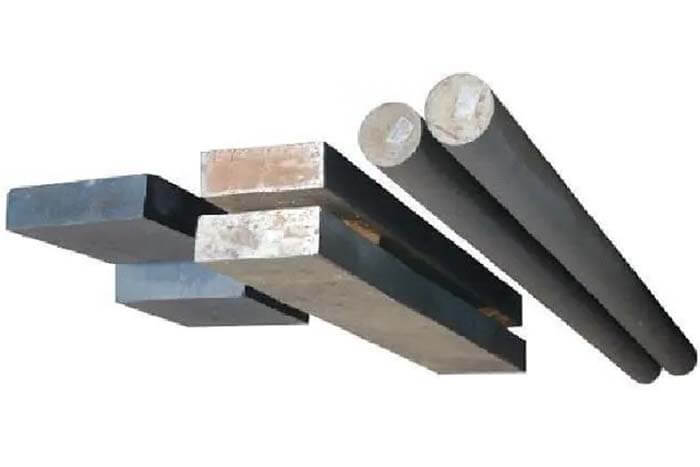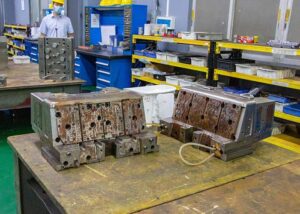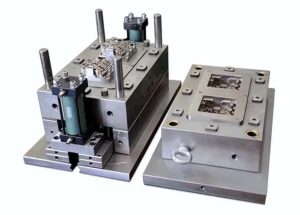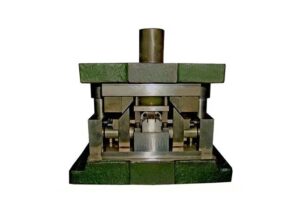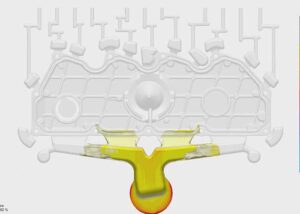This article introduces 24 different types of metal materials commonly used in machinery and mold processing and their characteristics!
Different types of metal materials 1. 45# steel
What is 45# steel?
45# is a high-quality carbon structural steel, corresponding to the Japanese standard S45C, American standard: 1045, and German standard C45. Its characteristics are higher strength, and resistance to deformation compared to ordinary A3 steel.
45# steel is a high-quality carbon structural steel, the most commonly used medium carbon tempered steel main features: the most commonly used medium carbon tempered steel, has good overall mechanical properties, low hardenability, water quenching cracking. Small parts should be tempered and large parts should be normalized.
Application examples: Mainly used in the manufacture of high-strength moving parts, such as injection mold clamps, turbine impellers, and compressor pistons. Shafts, gears, racks, worm gears, etc. The welded parts should be preheated before welding stress relieved and annealed after welding.

Different types of metal materials 2. Q235A (A3 steel)
What is Q235A (A3 steel)?
Q235A (A3 steel) is the most commonly used carbon structural steel.
Main features: High plasticity, toughness and welding properties, cold stamping properties, and certain strength, good cold bending properties.
Application examples: Widely used for general requirements of parts and welded structures. Such as tension rods, connecting rods, pins, shafts, screws, nuts, rings, brackets, machine bases, building structures, bridges, etc., which are not subjected to enormous forces.
Different types of metal materials 3. 40Cr steel
What is 40Cr steel?
40Cr steel is one of the most widely used steel grades and belongs to alloy structural steel.
Main features: after tempering, it has good overall mechanical properties, low-temperature impact toughness and low notch sensitivity, good hardenability, high fatigue strength can be obtained when oil-cooled, water-cooled parts of complex shapes are easy to produce cracks, cold bending plasticity is medium, tempering or tempering after cutting machinability is good.
However the weldability is not good, easy to produce cracks, and should be preheated to 100 ~ 150 ℃ before welding, generally used in the tempered state, but also for carbonitriding and high-frequency surface quenching treatment.
Application examples: after tempering treatment for the manufacture of medium speed, medium load parts, such as machine tool gears, shafts, worm gears, spline shafts, ejector bushings, etc., tempering and high-frequency surface quenching for the manufacture of high surface hardness, wear-resistant parts.
Such as gears, shafts, spindles, crankshafts, mandrels, sleeves, pins, connecting rods, screws, and nuts, intake valves, etc., after quenching and medium-temperature tempering for the manufacture of heavy-duty, medium-speed impact parts.
Such as oil pump rotors, sliders, gears, spindles, rings, etc., after quenching and low-temperature tempering for the manufacture of heavy-duty, low-impact, wear-resistant parts, such as worm shafts, spindles, shafts, rings, etc., carbonitriding at that after the manufacture of larger size, low-temperature impact toughness of transmission parts, such as shafts, gears.
Different types of metal materials 4. HT150 steel
What is HT150 steel?
HT150 steel is gray cast iron application examples: gearbox body, machine tool bed, box, hydraulic cylinder, pump body, valve body, flywheel, cylinder head, belt wheel, bearing cover, etc.
Different types of metal materials 5. 35# Steel
What is 35# steel?
35# steel is the common material for various standard parts and fasteners.
Main features: appropriate strength, good plasticity, high cold plasticity, and weldability are still possible.
It can be partially upsetting and draw in a cold state. Hardenability is low, normalized, or tempered application examples: suitable for the manufacture of small cross-sectional parts, parts that can withstand large loads: such as crankshafts, levers, connecting rods, hooks, and loops, etc., a variety of standard parts, fasteners.
Different types of metal materials 6. 65Mn steel
What is 65Mn steel?
65Mn steel is a commonly used spring steel.
Application examples: small sizes of various flat, round springs, seat springs, and spring clockwork, can also be made spring rings, valve springs, clutch reeds, brake springs, cold coil springs, card springs, etc.
Different types of metal materials 7. 0Cr18Ni9 steel
What is 0Cr18Ni9 steel?
0Cr18Ni9 steel is the most commonly used stainless steel (American steel number 304, Japanese steel number SUS304)
Characteristics and applications: Stainless heat-resistant steel is used most widely, such as food equipment, general chemical equipment, and the original energy industrial equipment.
Different types of metal materials 8. Cr12 steel
What is Cr12 steel?
Cr12 steel is a common cold work tool steel (American steel D3, Japanese steel SKD1).
Cr12 steel characteristics and applications: Cr12 steel is a widely used cold work tool steel, and is a high-carbon high chromium type of Leydenite steel. The steel has good hardenability and good wear resistance.
As the carbon content of Cr12 steel is as high as 2.3%, so the impact toughness is poor, easy to brittle crack, and easy to form uneven eutectic carbide.
Cr12 steel due to good wear resistance is mostly used in the manufacture of small impact load that requires high wear resistance of cold punching dies, punches, down feed dies, cold upsetting dies, cold extrusion die punches concave dies, drill sets, gauges, wire drawing dies, embossing dies, thread rolling plates, deep drawing dies and cold pressing dies for powder metallurgy, etc.
Different types of metal materials 9. DC53 steel
What is DC53 steel?
DC53 steel is a commonly used Japanese imported cold work tool steel.
Characteristics and applications: High toughness cold work die steel, Japan Daido Special Steel (Co.) manufactures steel. It has high hardness and toughness after high-temperature tempering and good wire cutting.
Used for precision cold stamping dies, drawing dies, thread rolling dies, cold punching and cutting dies, punches, etc.
Different types of metal materials 10. DCCr12MoV steel
What is DCCr12MoV steel?
DCCr12MoV steel is wear-resistant chromium steel, made in China.
The carbon content is lower than Cr12 steel, and with the addition of Mo and V, the carbide unevenness is improved, MO can reduce carbide segregation and improve hardenability, and V can refine the grain to increase toughness.
This steel has high hardenability, cross-section below 400mm can be completely hardened, in 300 ~ 400 ℃ can still maintain good hardness and wear resistance, higher toughness than Cr12, the quenching volume change is small, but also has high wear resistance and good overall mechanical properties.
Therefore, it can be used to make a variety of dies with a large cross-section, complex shapes, and large impact, such as common drawing die, punching die, punching die, drop die, cutting die, rolling die, wire drawing die, cold extrusion die, cold cutting scissors, circular saw, standard tools, gauges, etc.
Different types of metal materials 11. SKD11 steel
What is SKD11 steel?
SKD11 steel is tough chromium steel, produced by Hitachi, Ltd. in Japan.
SKD11 steel technically improves the casting organization in the steel and refines the grain. It has improved toughness and wear resistance compared to Cr12mov. Extend the life of the mold.
Different types of metal materials 12. D2 steel
What is D2 steel?
D2 steel is a high-carbon, high-chromium cold work steel, made in the United States.
D2 steel has high hardenability, hardenability, wear resistance, high-temperature oxidation resistance, good resistance to rust and corrosion after quenching and polishing, and small heat treatment deformation.
D2 steel is used in the manufacture of various cold work molds, tools, and gauges that require high precision and long life, such as tensile dies, cold extrusion dies, cold shear knives, etc.
Different types of metal materials 13. SKD11(SLD) steel
What is SKD11(SLD) steel?
SKD11(SLD) steel is a non-deformable and tough high-chromium steel, produced by Hitachi, Ltd.
Due to the increase of MO and V content in the steel, it improves the casting organization, refines the grain, and improves the carbide morphology, so the toughness (flexural strength, deflection, impact toughness, etc.) of this steel is higher than SKD1 and D2. The wear resistance is also increased, and it has a higher tempering resistance.
It is proved that the life of this steel has been improved compared with Cr12mov. It is often used in the manufacture of demanding molds, such as tensile molds, impact grinding wheel molds, etc.
Different types of metal materials 14. DC53 steel
What is DC53 steel?
DC53 steel is high toughness and high chromium steel, produced by Daido Corporation of Japan.
DC53 steel heat treatment hardness than SKD11. high temperature (520-530) after tempering up to 62-63HRC high hardness, in strength and wear resistance DC53 more than SKD11. toughness is SKD11 twice.
The toughness of DC53 rarely cracks and crazes in cold work tool-making. It greatly improves service life. Low residual stresses. Reduced residual stresses after high-temperature turning. Cracking and deformation are suppressed due to the wire-cutting process. Machinability and grind ability exceed those of SKD11.
DC53 steel is used for precision stamping dies, cold forging, deep drawing dies, etc.
Different types of metal materials 15. SKH-9 steel
What is SKH-9 steel?
SKH-9 steel is general-purpose high-speed steel with high wear resistance and toughness, produced by Hitachi, Ltd. in Japan.
SKH-9 steel is used for cold forging dies, strip cutters, drills, reamers, punches, etc.
Different types of metal materials 16. ASP-23 Steel
What is ASP-23 steel?
ASP-23 steel is a powder metallurgical high-speed steel, made in Sweden.
ASP-23 steel has extremely uniform carbide distribution, wear resistance, high toughness, easy machining, and dimensional stability with heat treatment.
ASP-23 steel is used for long-life cutting tools such as punches, deep drawing dies, drilling dies, milling cutters, and shear blades.
Different types of metal materials 17. P20 Steel
What is P20 steel?
P20 steel is generally required for small and large plastic molds, made in the USA. Can be an electro-etching operation. Factory condition pre-hardened HB270-300. hardened HRC52.
Different types of metal materials 18. 718 steel
What is 718 steel?
718 steel is highly demanding for small and large plastic molds, made in Sweden. Especially for electro-etching operations. 718 steel factory condition pre-hardened HB290-330. hardened HRC52.
Different types of metal materials 19. Nak80 steel
What is Nak80 steel?
Nak80 steel is used for high mirror surfaces, and high-precision plastic molds, produced by Daido Corporation of Japan. Nak80 steel factory condition pre-hardened HB370-400.
Different types of metal materials 20. S136 steel
What is S136 steel?
S136 steel is used for anti-corrosion and mirror polishing plastic molds, produced in Sweden. S136 steel factory state pre-hardened HB <215. quenching hardness HRC52.
Different types of metal materials 21. H13 Steel
What is H13 steel?
H13 steel is commonly used in die casting for aluminum, zinc, magnesium, and alloy die casting. Hot stamping dies, aluminum extrusion die.
Different types of metal materials 22. SKD61 steel
What is SKD61 steel?
SKD61 steel is a high-grade die casting die, produced by Hitachi, Ltd. in Japan, which is significantly improved in service life than H13 steel by the technology of ballast re-solution. SKD61 steel is mostly used in hot stamping dies and aluminum extrusion dies.
Different types of metal materials 23. 8407 steel
What is 8407 steel?
8407 steel is a high-grade die-casting die, made in Sweden. It is used for hot stamping dies and aluminum extrusion dies.
Different types of metal materials 24. FDAC Steel
What is FDAC steel?
FDAC steel has added sulfur to enhance its ease of cutting, has factory pre-hardening hardness 338-42HRC, and can be directly engraved, with no quenching and tempering treatment.
FDAC steel is used for small batch molds, simple molds, various resin products, sliding parts, short lead time mold parts, zipper molds, and glass frame molds.
Besides the What Are The 24 Different Types Of Metal article, you may also be interested in the below articles?
Summary Of 50 Injection Mold Structure Operation Dynamic Diagrams
Auto Parts Stamping Die Design Concept
